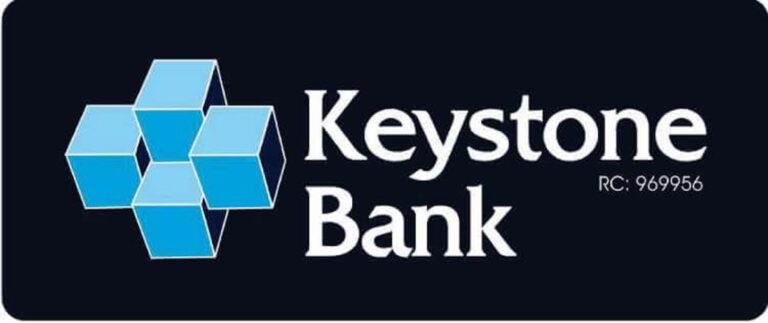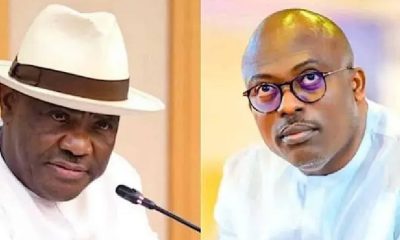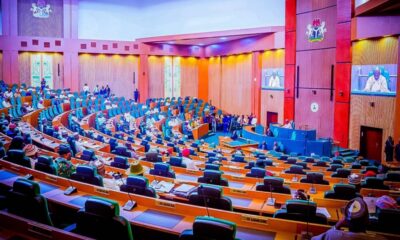Economy
BREAKING: CBN Endorses New Board For Keystone Bank (SEE LIST)

By Mario Deepromoter
The Central Bank of Nigeria (CBN) has reconstituted the board of directors of Keystone Bank.
The move was announced on Wednesday, as part of the apex bank’s strategy to ensure sustained growth for the financial institution.
According to a statement from the Keystone Bank, Lady Ada Chukwudozie has been appointed as the new board chairman, alongside five other non-executive directors. They are Abdul-Rahman Esene, Mrs. Fola Akande, Akintola Ayodeji Olusoji, Obijiaku Samuel, and Senator Farouk Bello.
In addition, the CBN also named two new executive directors, Ladi Oluwole and Abubakar Usman Bello.
Lady Ada Chukwudozie, a prominent figure in Nigeria’s corporate sector, brings nearly three decades of experience in business strategy, management, and administration.
Her expertise cuts across multiple industries, including De-Endy Industrial Company Limited, Dozzy Group, the Manufacturers Association of Nigeria, and Vogue Afrique Magazine.
Abdul-Rahman Esene, with over 43 years of experience in banking, investment management, and corporate finance, has held leadership roles in major institutions such as Fidelity Bank, Afrinvest, and Global Arbitrage International Inc.
Mrs Fola Akande boasts over 25 years of experience in legal, compliance, and risk management, having worked with global brands like Cadbury, Stanbic Chartered Bank, and Shell.
Akintola Ayodeji Olusoji has a distinguished 30-year career in accounting, finance, and business development, having served at institutions such as Sterling Bank, Access Bank, and Intercontinental Bank.
Obijiaku Samuel, with more than 35 years of experience in banking and treasury operations, has left a significant mark on Nigeria’s financial sector, previously working with Zenith Bank and Fidelity Bank.
Senator Farouk Bello, a seasoned banker with over 20 years of experience, has led initiatives across both the public and private sectors, including the National Assembly and Guaranty Trust Bank.
Meanwhile, the two new executive directors bring their vast expertise to the table. Ladi Oluwole, the new Executive Director of Risk Management, comes with over two decades of experience in credit and enterprise risk management, including previous roles at Bank of America. Abubakar Usman Bello, Executive Director for the Northern Directorate, has extensive experience managing corporate, retail, and public sector clients.
Speaking on the appointments, Keystone Bank’s Managing Director and CEO, Hassan Imam, expressed confidence in the new board members, stating that their wealth of experience would play a crucial role in the bank’s continued repositioning and growth.
“We are pleased to welcome the new chairman, non-executive directors, and executive directors to the board of Keystone Bank. We are confident that their extensive experience will be invaluable as we continue to reposition the bank to seize emerging economic opportunities while maintaining strong corporate governance and providing our customers with a secure and reliable banking experience,” Imam said.
Economy
75.5% of rural Nigerians now live below poverty line — World Bank

The World Bank has disclosed that a staggering 75.5 per cent of rural Nigerians are now living below the poverty line, reflecting deepening hardship in the country’s hinterlands.
This was revealed in the Bank’s April 2025 Poverty and Equity Brief for Nigeria, which paints a grim picture of worsening economic hardship, widening inequality, and persistent underdevelopment across much of the nation.
While poverty is widespread among urban populations, the report emphasised that the situation is significantly worse in rural areas, where economic stagnation, high inflation, and insecurity have exacerbated living conditions.
“Based on the most recent official household survey data from Nigeria’s National Bureau of Statistics, 30.9 per cent of Nigerians lived below the international extreme poverty line of $2.15 per person per day in 2018/19 before the COVID-19 pandemic,” the report stated.
The report also highlighted Nigeria’s enduring regional disparities. “Nigeria remains spatially unequal. The poverty rate in northern geopolitical zones was 46.5 per cent in 2018/19, compared with 13.5 per cent for southern ones. Inequality measured by the Gini index was estimated at 35.1 in 2018/19.
“Nigeria’s Prosperity Gap — the average factor by which individuals’ incomes must be multiplied to attain a prosperity standard of $25 per day for all — is estimated at 10.2, higher than most peers.”
Despite successive policy interventions, these figures underscore a persistent economic divide across the country.
The report’s demographic analysis found that children aged 0 to 14 years had a poverty rate of 72.5 per cent, reflecting the scale of deprivation among the youngest segment of the population.
Gender disparities were also observed, with 63.9 per cent of females and 63.1 per cent of males classified as poor under the $3.65 per day lower-middle-income threshold.
Education emerged as a significant determinant of poverty, with Nigerians lacking formal education experiencing a poverty rate of 79.5 per cent. This contrasts with 61.9 per cent for those with primary education and 50.0 per cent for secondary school graduates. Only 25.4 per cent of those with tertiary education were considered poor.
The report also drew attention to multidimensional poverty indicators, which further reflect widespread deprivation.
According to the World Bank, about 30.9 per cent of Nigerians live on less than $2.15 daily, 32.6 per cent lack access to limited-standard drinking water, 45.1 per cent do not have limited-standard sanitation, and 39.4 per cent have no electricity.
Education access remains a challenge, with 17.6 per cent of adults yet to complete primary education, and 9.0 per cent of households reporting at least one school-aged child not enrolled in school.
The report noted that even before the COVID-19 pandemic, efforts to reduce extreme poverty had largely stalled.
“Before COVID-19, extreme poverty reduction had almost stagnated, dropping by only half a percentage point annually since 2010. Living standards of the urban poor are hardly improving, and jobs that would allow households to escape poverty are lacking,” the report read.
Although the World Bank acknowledged recent economic reforms aimed at stabilising Nigeria’s macroeconomic outlook, it warned that persistently high inflation continues to undermine household purchasing power, particularly in urban areas where incomes have not kept pace with rising costs.
In light of the worsening situation, the Bank called for urgent policy action to shield vulnerable groups from inflationary shocks and to drive job creation through more productive economic activities.
Economy
Naira Records Marginal Decline Against Dollar at Official Market

The Nigerian naira experienced a mild drop in value on Friday, closing at ₦1,602.18 per dollar in the official foreign exchange market, based on figures released by the Central Bank of Nigeria (CBN).
This marks a decrease of ₦5.49 from the rate of ₦1,596.69 recorded on April 30, the last trading day before the May 1 Workers’ Day holiday—indicating a depreciation of approximately 0.34%.
Earlier in the week, from Monday to Wednesday, the naira remained relatively stable, exchanging at ₦1,599.95, ₦1,599.71, and ₦1,596.69 respectively.
Although the local currency showed some consistency mid-week, it wrapped up the week with a loss, following a sligh dip of 0.02% at the beginning of the week
Economy
Black Market Dollar hits N1,610 Amid Economic quagmire

What is the Dollar to Naira Exchange Rate in the Black Market (Also Known as the Parallel Market or Aboki FX)?
Below is the black market exchange rate for the U.S. dollar to the Nigerian naira as of Thursday, May 1, 2025. These are the typical rates at which you can exchange dollars for naira:
Dollar to Naira Black Market Exchange Rate (May 1, 2025):
At the Lagos Parallel Market, also referred to as the black market, Bureau De Change (BDC) operators are buying dollars at ₦1,602 and selling at ₦1,610, according to market sources.
Please note: The Central Bank of Nigeria (CBN) does not recognize or endorse transactions conducted on the parallel market. The CBN advises individuals and businesses seeking foreign exchange to use official banking channels.
-

 Opinion10 hours ago
Opinion10 hours agoRIVERS, WIKE, FUBARA, AND THE WAY FORWARD
-

 Politics9 hours ago
Politics9 hours agoJust in: Delta PDP Reps members defect to APC
-

 News20 hours ago
News20 hours agoFULL STEPS: How to check 2025 JAMB results
-

 News20 hours ago
News20 hours agoMinistry denies awarding N13bn contracts without due process
-

 News14 hours ago
News14 hours agoVDM may be released on Tuesday
-

 News11 hours ago
News11 hours agoNANS Barricades Lagos-Ibadan Expressway Over Alleged NELFUND Mismanagement
-

 News11 hours ago
News11 hours agoCourt bans Nnamdi Kanu’s in-law from 3 proceedings over live streaming
-

 News7 hours ago
News7 hours agoTension As Lawmakers Warns of Public Revolt Over Insecurity





